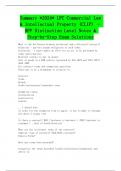Summary
Summary *2024* LPC Commercial Law & Intellectual Property (CLIP) – BPP Distinction Level Notes & Step-by-Step Exam Solutions
- Course
- Institution
Summary *2024* LPC Commercial Law & Intellectual Property (CLIP) – BPP Distinction Level Notes & Step-by-Step Exam Solutions What is the difference between unilateral and a bilateral contract? Bilateral - parties assume obligation to each other. Unilateral - 1 party makes an offer for an act t...
[Show more]



